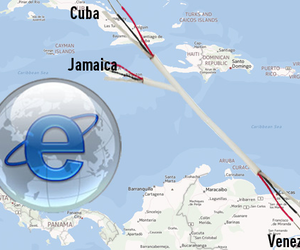Cuba turns on submarine internet cable, but just for one-way traffic
- Submitted by: lena campos
- Computers and Internet
- 01 / 21 / 2013

Internet traffic appears to only be flowing to, not from, the country via the cable, according to internet routing analyst Renesys
.
A change in Internet traffic patterns over the past week suggests that Cuba may have turned on a fiber-optic submarine cable that links it to the global Internet via Venezuela, according to Internet routing analysis company Renesys.
Renesys noticed that the Spanish telecommunications company TelefA3nica began routing Internet traffic to Cuba's state telecommunications company, Empresa de Telecomunicaciones de Cuba S.A. (ETECSA), wrote Doug Madory, senior research engineer.
The Internet traffic is flowing with significantly lower latencies than before, indicating the connection is not solely using the three satellite providers that Cuba has relied on in the past for connectivity, Madory wrote.
Cuba and Venezuela began building a submarine cable in 2007 called the "Alternativa Bolivariana para los Pueblos de nuestra América" or ALBA-1 for short. Jamaica is also connected to ALBA-1.
Due to delays, construction was not completed until 2011, and even then, Cuba continued to use the satellite internet providers despite announcing the cable had been completed, Madory wrote.
Renesys, which analyzes Internet routing data to improve network performance for its clients, saw Telefónica delivering data to Cuba in its routing data last week. But the data appears to be flowing only into Cuba and not out of the country, Madory wrote.
The latency times are still relatively high, but the fact that latency to Cuba from other parts of the world has dropped to below 480ms suggests that more than just the satellite connections are being used, Madory wrote. Satellite connections are typically slower than wired connections.
Still, if the data were being transmitted solely via submarine cable, latency times between Cuba and nearby countries should be less than 50 milliseconds, Madory wrote. For comparison, it takes 60ms for a packet of data to cross the Atlantic Ocean and about 110ms to cross the Pacific.
Madory wrote that either by design or misconfiguration, Telefónica may be supplying internet traffic only to Cuba via ALBA-1, meaning the country is still relying on satellite connections for outbound traffic.
"While the activation of the ALBA-1 cable may be a good first step to providing ETECSA a better link to the Internet, the lack of widespread public access to Internet service throughout the island will likely continue," Madory wrote.
As to the question of whether Cuba may be censoring content, Madory wrote that is likely not the case. Countries using technical means to control content often show noticeable daily traffic patterns.
"This is due to traffic slowing during busy times when everyone is awake and using the Internet, and the censorship software is struggling to keep up," Madory wrote.
The latency patterns noticed in Cuba appear "very similar to cases of asymmetric satellite" patterns that Renesys has observed in the past, Madory wrote.
Source: Computerworld.com
Comments